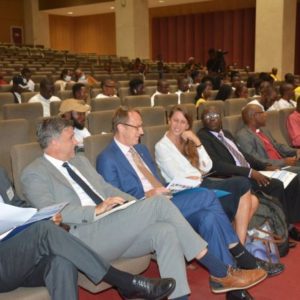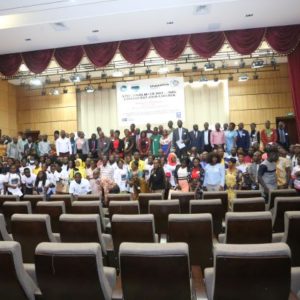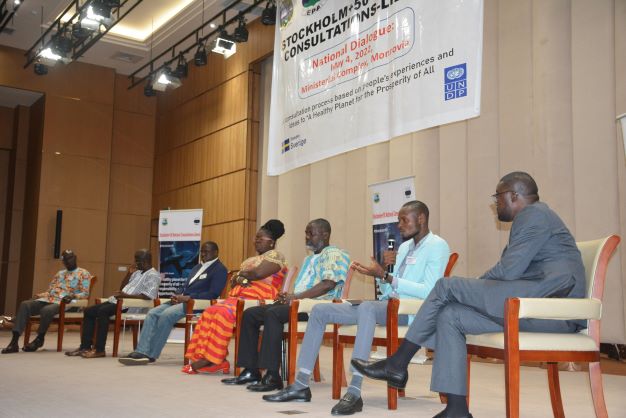Monrovia, Liberia-Two months after the launch of Liberia’s Stockholm+50 consultations, which included regional dialogues across a broad spectrum of the whole of society, the people of Liberia and other stakeholders are insisting on the urgent need for concrete actions to achieve a healthy planet and prosperity of all, says a UNDP press release.
During the grande finale consultations, held 4, May 2022, at the Ministerial Complex in Monrovia, panelists and participants jointly elevated the conversation emphasizing the need for people to stop paying lip service to the environmental challenges facing the country, and start acting.
“We need to be more action-oriented than just talking. There are so many times we talk, and nothing is being done,” said Atty. Tonieh Talery Wiles, Founder and Executive Director of Women Entrepreneurs & Environmental Links, echoing many speakers who have said the same thing during the consultations.

“To accelerate the implementation of the SDGs in the context of the Agenda2030, the Government of Liberia should follow up international commitments with concrete actions, for example, by revising its budget to adequately finance development, and make it gender responsive,” says Mathias M. Yeanay, the Executive Director of the Institute of Research and Democratic Development (IREDD).
Urias Goll, an environmental specialist with USAID’s EcoHealth Alliance buttressed Yeanay’s comments saying: “Liberia needs to budget adequately for environment management, build its environmental institutions, and begin to think of developing sustainable products”.
The Stockholm+50 consultations were organized by the Environment Protection Agency (EPA) with support from Sweden and facilitated by UNDP, as part of a global effort to stimulate discussions on the Earth’s triple crises – the climate emergency, the unprecedented socio-economic impacts of COVID-19, and continued degradation of natural ecosystems and biodiversity.

The consultations were designed as an inclusive process that brought on board the views of people from all walks of life – women, youth, civil society, academia, religious groups, people with disabilities; the whole of government and the whole of society, on how the country could attain a healthy environment that supports the prosperity of all people.
Speaking at the final national consultations, the Executive Director of the Environment Protection Agency (EPA) Professor Wilson Tarpeh said the proposals and recommendations from the consultations would be used to complete Liberia’s strategy for management the environment for the prosperity of the people and country.
He promised to re-look at the Agency’s budget to increase resources for information dissemination and awareness raising, saying less than one percent of the institution’s budget is currently spent on creating environmental awareness.
While appreciative of their inclusion in the Stockholm+50 consultations, people with disabilities lamented not having been sufficiently included in the country’s development initiatives such as the national response to COVID-19 and climate change.
“There is nothing about us without us,” said Peter Flomo, the President of the National Union of Organizations for people with Disabilities (NUOD).
“Disability is not inability. We can only survive in an environmentally friendly society. Dumping waste products in drainages and building on water ways results in flooding making it difficult for visually impaired and physically challenged to move around without resulting in their exclusion from society?”
Key issues that emerged from the consultations include the management of plastic waste and the need for better environmental sanitation, especially along the country’s beaches; enhancing sustainable forest management and governance; achieving food security and sustainable recovery from Covid-19, and dealing with corruption.
Participants at every consultation session held stressed the need for massive public awareness, advocacy and community outreach saying, “Monrovia is not Liberia”.
“We need clear information to pass on to our people through the religious community to help raise awareness. God charged man from the very beginning to care for the environment,” said Episcopal Bishop James B. Selee.
“To accelerate implementation of the environmental dimension of the SDGs in the context of Agenda2030, partners must plan with, and not for, the media in order to effectively raise public awareness,” said Siatta Scott-Johnson, President of the Female Journalist Association of Liberia (FEJAL).
UN Resident Representative Niels Scott commended the media for taking the Stockholm+50 discussions into the homes of Liberians.
In the wake of Liberia signing a new international treaty aimed at ending the use of single use plastics, stakeholders in the waste management sector said opportunities for recycling plastic were “endless”, recommending that the government evaluate the plastic waste value chain, scientifically study the problem, follow through its commitments, develop a system for shared responsibility of waste management between government and other stakeholders.
“Liberia should consider using the tax system to control plastic pollution by putting a price tag on all plastic products,” said Dorsla Farcarthy, the team leader for UNDP’s Green and Inclusive Growth Programme.
On forest management, Atty. Gertrude Nyanley-Korvayan of the Forestry Development Authority (FDA) highlighted the absence and sidelining of women, whose lives and livelihoods are intricately linked to the country’s forests.
“The rural Liberian woman sees the forest as her hospital, her market, her supermarket yet she is grossly under-represented in its governance right from the community level. This must change,” she lamented.
The international community was asked to be fair and compensate Liberia for protecting its forests for the carbon sequestration services they were rendering. “We have not received any results-based payment for the forests we have been protecting. We ask for a fair share for keeping our landscapes as pristine as possible; this is to enable our citizens living on the fringes of forests to make a livelihood,” said Mr. Johnson Willabo, the Assistant Minister for Mines and Energy.
Some students were concerned about their prospects for getting jobs, the quality of education and health services, as well as leadership, particularly at the community level. They also expressed concern that the scourge of corruption was compromising their future.
The Covid-19 pandemic, which took a heavy toll on jobs and employment, was described as a good early warning mechanism that revealed the need for Liberia to pay attention to domestic food production and build resilience. “What we are doing now is importing poverty and exporting our wealth, which must stop,” said Robert Bimba of Community of Hope Agriculture Project (CHAP).
FAO’s Dr. Patrice Savadogo said farmers needed climate information at the right time in order to know what to plant and when, if green recovery was to be accomplished. “We must eat what we produce and produce what we eat,” he reiterated.
UNDP’s Resident Representative Stephen Rodriques warned: “With the world having lost about 68% of its species since 1972, it looks as if humanity is choosing extinction. Everyone must seize the opportunity presented by these consultations to take positive actions for the environment in their own way. These individual actions add up to make the BIG change we all want to see.”
The various ideas, views and proposals from the consultations will be compiled into a national report to be presented at the Stockholm+50 international meeting scheduled to take place in Stockholm from June 2-3, 2022.

